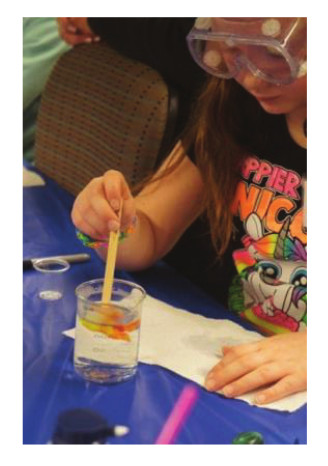 By Nancy Foote
By Nancy Foote
When a little kid comes up to you and asks you do science, it’s hard to say no. But when you’re a science teacher, and that little kid is your granddaughter, you know you have to come up with something fast.
 By Nancy Foote
By Nancy Foote
When a little kid comes up to you and asks you do science, it’s hard to say no. But when you’re a science teacher, and that little kid is your granddaughter, you know you have to come up with something fast.

By Dr. Kenneth Lyle, Duke University, Durham NC and Elaine “Lainey” Williams
 Thermoplastic Polymers for All!
Thermoplastic Polymers for All!When thermoplastic polymer became available a couple of years ago, we purchased a bottle to see if it would be a viable addition to our chemistry outreach program. Since then, literally hundreds of people, young and old, have experienced molding the thermoplastic, taking their creations home in Zip-loc® bags.
And now, with the availability of dyes, a whole new world of creative design has opened up. The molding of a thermoplastic activity has been incorporated into our “Polymers” and “Chemistry of Crafts” hands-on outreach presentations, and has been used as a stand-alone station.
 Hands-on lessons make learning more interesting and engaging. We found a delightful green science lesson that enables kids to look at green energy in a new way. Not only can your students quantify the work that wind can do… they’ll design their own windmills using paper, string, some clips and a cup.
Hands-on lessons make learning more interesting and engaging. We found a delightful green science lesson that enables kids to look at green energy in a new way. Not only can your students quantify the work that wind can do… they’ll design their own windmills using paper, string, some clips and a cup.
And who doesn’t love a windmill?
 by Ted Beyer
by Ted Beyer
We love our customers, and not just because they help keep the lights on! Educational Innovations’ customers share amazing things with us all the time. In fact, some of our best products have been created as a result of our customers’ discoveries, suggestions, or requests.
Recently, we received a comment on our website regarding our color-changing goldenrod paper. It prompted us to try a brand-new experiment that we think you’ll enjoy.
 by Ted Beyer
by Ted Beyer
Brushbots, bristlebots, scooterbots, and any other cleverly named bots have been around for years. You know—the toothbrush head (or something similar) paired with a tiny vibrating motor and a battery. For years, classroom teachers and homeschool parents have been using them to introduce even young students to the principles of engineering and robotics.